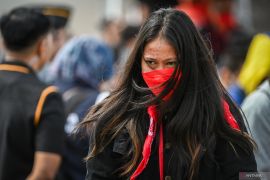This failure extends the wait for the ratification of RUU TPKS that had been proposed since 2016.
According to DPR Deputy Speaker Sufmi Dasco Ahmad, a technical issue was the reason behind the bill not being brought to the plenary meeting.
The issue was that the time limit for the leadership meeting and deliberation agency had passed.
Discussion for the RUU TPKS was not yet over at the level I, thereby leaving no time for it to be included in the agenda of the leadership meeting and deliberation agency.
While awaiting its return, what exactly is the background of sexual violence cases in the nation? Moreover, what drives the urgency for the bill's ratification and why are there those who oppose it?
The prevalence of sexual violence in Indonesia is apparent from the emergence of several cases.
COVID-19 is not the only plague that exists, as sexual violence has become a pandemic of sorts, with no end in sight.
According to the National Commission on Violence Against Women's (Komnas Perempuan's) 2021 annual record, 299,991 cases of violence against women were reported in 2020.
Sexual violence cases dominated the data, with 45.6 percent of them occurring in the public space while 17.8 percent in the private domain.
Data from the Women's Empowerment and Child Protection Ministry presented a similarly grim picture.
According to the data collection in 2019, the number of cases of violence against children totaled 11,057, while 11,279 cases were reported in 2020, and 12,566 cases until November 2021.
From these cases, sexual violence, once again, became the one to be most frequently experienced by children, at 45 percent.
Moreover, a recent sexual violence case came to light wherein a pesantren, a boarding school, administrator had harassed and raped 11 of his students.
This data presentation drives the urgency to ratify the RUU TPKS to act as a legal umbrella to halt the pace of the sexual violence pandemic.
Related news: Komnas Perempuan seeks immediate ratification of sexual violence bill
Urgency to ratify the bill
Politician from the Greater Indonesia Movement (Gerindra) Party Rahayu Saraswati Djojohadikusumo deemed it important to immediately ensure that the bill becomes DPR's initiative bill and ratify it into a law.
Several existing regulations have not yet specifically regulated matters that concern prosecution in sexual violence cases that could provide justice and protection for victims, she noted.
The Criminal Code (KUHP), Child Protection Law, Information and Electronic Transactions (ITE) Law, and even the Pornography Law could not offer legal protection to Indonesian citizens, who became victims of sexual violence.
A similar opinion was also voiced by law practitioner Gugum Ridho Putra. Specifically, he discussed the absence of prosecution in sexual violence cases within the KUHP.
The KUHP does not yet cover non-physical sexual violence, such as a verbal crime that attack the victims' psyche and intimidate them, he highlighted.
In addition, the stipulations within KUHP do not yet accommodate the best interests of sexual violence victims that leads these cases to become an iceberg phenomenon.
This phenomenon means that the revealed cases are a fraction of the actual case count, as several victims stayed mum for various reasons.
For instance, they were afraid nobody will believe their testimonies or they felt shame over their experience, and they believed that the law within the nation did not side with them.
Furthermore, the KUHP still applies the same legal process for sexual violence cases akin to other criminal cases that necessitates two sufficient evidences.
This is despite the fact that not all victims are capable of presenting evidences.0
Related news: Expedite sexual violence bill passage: MPR deputy speaker
Opposition to the bill's ratification
While there is a real urgency in ratifying the RUU TPKS, facts on the field led several parties to oppose its ratification.
According to Putra, one of the factors that led to the rejection of the bill is its title.
Several parties believe that the word "violence" in the title can potentially lead to a new issue, specifically the non-violence aspect that ends up not being stipulated within the regulation.
With this, every non-violence sexual crime will not be penalized. To this end, these parties proposed to change the bill's title to sexual crime prevention bill.
The next reason involves the indication of sexual consent, meaning there was no prohibition to fornication and same-sex relations, which indicates such behaviors are accepted within the bill.
In response, Head of the Sexual Violence Prevention Bill Work Committee Willy Aditya stressed that the bill does not contain sexual consent.
The perspective that sexual consent is contained within the bill was the result of a misunderstanding among several parties, he explained.
Based on these reasons, it is understandable that there are rejections to the RUU TPKS that could actually become an input to make the regulation better.
Related news: Sexual violence prevention bill will ensure victims' rights: ministry
Hope for the bill in future
The various problems and oppositions do not mean that the RUU TPKS does not have any hope of being ratified. Despite differing perspectives, there still exists an opportunity of finding a way out.
To this end, the hope for the bill to become DPR's initiative bill and then ratified stills exist.
DPR's hard work in responding to the people's legal need, specifically a stringent legal protection to protect people from sexual harassment cases, still has to be lauded, Putra affirmed.
While it is urgent to have the bill ratified, the formulation of the regulation should be done with precision to prevent the presence of any ambiguous articles, he remarked.
The existence of these ambiguous articles could potentially allow them to be exploited by morally corrupt parties and become a gateway to a host of other legal issues.
Based on these factors, it can be concluded that the monitoring and encouragement of the bill's ratification to become a legal shield from all kinds of sexual violence is unavoidable.
In addition, it is equally important to understand that the long wait for the bill's ratification due to various existing perspectives should be positively channeled into hope and optimism.
This is since these varying perspectives would allow the regulation to become the best legal protection against sexual violence for Indonesia.
Related news: To address sexual violence, ensuring victims' rights crucial
Related news: Progress of sexual violence prevention bill offers hope for victims
Translator: Tri Meilani A, Fadhli Ruhman
Editor: Suharto
Copyright © ANTARA 2021












